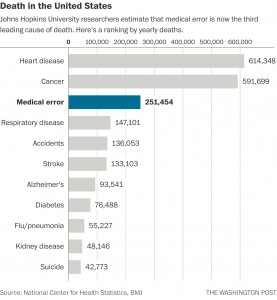Medical Malpractice is Now the 3rd Leading Cause of Death in America

A new study shows that medical errors are more common than we once thought, and are now the third-leading cause of death in the United States. Over 251,000 lives are estimated to have been lost every year due to medical mistakes–more than respiratory disease, auto accidents, stroke and Alzheimer’s disease.
Johns Hopkins Medicine conducted a study which stated medical errors should be considered the third leading cause of death. It also highlighted something very alarming: failure to effectively track vital statistics has the potential to obstruct research and thus prevent the public awareness of the seriousness of the problem. The study was led by Dr. Martin Makary, a surgeon at Johns Hopkins. In the study, the authors recommend making changes in death certificates in order to show fatal lapses in patient care.
According to previous research conducted by Johns Hopkins, more than 250,000 Americans lose their lives every year because of medical errors. If you use the CDC list as a guideline, that would place it just after heart disease and cancer (each near 600,000 deaths in 2014) and right above respiratory disease (around 150,000 deaths in 2014). The medical errors that result in death vary substantially, from unrecognized surgical complications to wrong dosages of medications or even the types of medications the patients actually receive (the latter can include problems not only in hospitals and other medical facilities, but also at the pharmacy).

Credit: The Washington Post
The problem with statistics.
No one has any concrete data on how many cases of medical errors actually occur each year. One of the significant reasons for this is because the coding system the CDC uses to record information on death certificates doesn’t include information such as breakdowns in communication, diagnostic errors, and poor judgment calls that result in the loss of life.
The above information was published in early May of this year in what used to be called the British Medical Journal (currently the BMJ). However, the chief of the mortality statistics area of the CDC disagreed with reports that the problem lies with the agency’s coding. According to this CDC spokesperson, they do list complications from medical care on death certificates. He also stated that these codes are captured by their system.
Another problem with the CDC’s statistics is that they only count the underlying cause of death, namely the condition that first led the person to seek medical treatment. What this means is that even if the attending physician states on the death certificate that a medical error caused the patient’s death, it is not included with the published statistics of the CDC; only the underlying cause (heart disease, respiratory arrest, cancer, etc.) is counted–even when those conditions were not directly responsible for the fatality.
The effect on public disclosure.
It is the belief of the CDC that because their approach is consistent with guidelines that are used internationally, it would be difficult to change unless there was an extremely compelling reason to make that change. According to the authors who conducted the study at Johns Hopkins, the failure to capture detailed information about medical errors causes limited information to reach the public and prevents an investment in research. They requested the addition of a question on the death certificates about whether a preventable complication contributed to the death.
According to the National Patient Safety Foundation, medical errors are the third most common cause of death. The president of the organization believes a better system of tracking would help improve funding and public awareness of the problem.
In Texas, tort reform has made it much more difficult to pursue cases that involve medical malpractice. This prevents injured parties from collecting damages in the event of a medical error. Also, failing to hold people responsible for their actions is not in the best interest of the general public, because failing to hold a party responsible can only lead to the potential for more medical errors.
Category: In Depth






